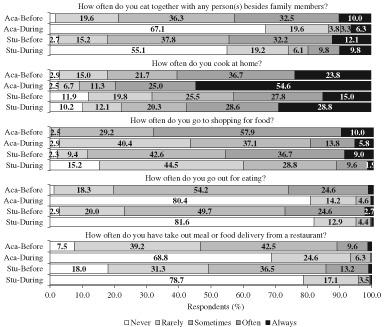当前位置:
X-MOL 学术
›
J. Food Saf.
›
论文详情
Our official English website, www.x-mol.net, welcomes your feedback! (Note: you will need to create a separate account there.)
Food safety knowledge, hygiene practices, and eating attitudes of academics and university students during the coronavirus (COVID-19) pandemic in Turkey
Journal of Food Safety ( IF 2.4 ) Pub Date : 2021-08-18 , DOI: 10.1111/jfs.12926 Nurullah Görür 1 , Zeynal Topalcengiz 2
Journal of Food Safety ( IF 2.4 ) Pub Date : 2021-08-18 , DOI: 10.1111/jfs.12926 Nurullah Görür 1 , Zeynal Topalcengiz 2
Affiliation

|
The purpose of this study is to assess the effect of the coronavirus (COVID-19) pandemic on food safety knowledge, hygiene practices, and eating attitudes of academics and university students in Turkey. A cross-sectional survey invitation was emailed to the participants from various academic ranks and departments at chosen universities from different region of country. Academics were requested to forward the invitation email to enrolled students to their classes. Responds were accepted in the period of 45 days in April and May 2020 during this pandemic. The relationships between socio-demographic factors (gender, marital status, parental status, faculty/student status, academic rank, and age) and food safety knowledge, hygiene practices, and eating attitudes of respondents were determined. Academics (n = 240) and university students (n = 479) responded to food safety knowledge statements with similar percentages during the coronavirus pandemic. Improved hygiene practices were observed for both groups to avoid disease during the coronavirus pandemic. Both groups had eating attitudes toward consumption at home due to the coronavirus pandemic. Gender was the most prominent factor associated with 9 out of 10 hygiene practices before and during the coronavirus pandemic (p < .05). No, single, and multiple socio-demographic factors were in association with food safety knowledge or eating attitudes of respondents. This study indicates that reactions of both academics and university students are similar during the coronavirus pandemic for food safety-associated knowledge, practices, and attitudes.
中文翻译:

土耳其冠状病毒 (COVID-19) 大流行期间学者和大学生的食品安全知识、卫生习惯和饮食态度
本研究的目的是评估冠状病毒 (COVID-19) 大流行对土耳其学者和大学生的食品安全知识、卫生习惯和饮食态度的影响。横断面调查邀请已通过电子邮件发送给来自国家不同地区选定大学的不同学术等级和部门的参与者。学者们被要求将邀请电子邮件转发给已注册的学生到他们的班级。在这次大流行期间,在 2020 年 4 月和 2020 年 5 月的 45 天内接受了回复。确定了社会人口因素(性别、婚姻状况、父母身份、教师/学生身份、学术等级和年龄)与受访者的食品安全知识、卫生习惯和饮食态度之间的关系。学者 ( n = 240) 和大学生 ( n = 479) 在冠状病毒大流行期间对食品安全知识陈述的反应百分比相似。观察到两组都改善了卫生习惯,以避免在冠状病毒大流行期间生病。由于冠状病毒大流行,这两个群体对在家消费都有饮食态度。在冠状病毒大流行之前和期间,性别是与十分之九的卫生习惯相关的最突出因素(p < .05)。不,单个和多个社会人口因素与受访者的食品安全知识或饮食态度有关。这项研究表明,在冠状病毒大流行期间,学者和大学生对食品安全相关知识、实践和态度的反应相似。
更新日期:2021-10-08
中文翻译:

土耳其冠状病毒 (COVID-19) 大流行期间学者和大学生的食品安全知识、卫生习惯和饮食态度
本研究的目的是评估冠状病毒 (COVID-19) 大流行对土耳其学者和大学生的食品安全知识、卫生习惯和饮食态度的影响。横断面调查邀请已通过电子邮件发送给来自国家不同地区选定大学的不同学术等级和部门的参与者。学者们被要求将邀请电子邮件转发给已注册的学生到他们的班级。在这次大流行期间,在 2020 年 4 月和 2020 年 5 月的 45 天内接受了回复。确定了社会人口因素(性别、婚姻状况、父母身份、教师/学生身份、学术等级和年龄)与受访者的食品安全知识、卫生习惯和饮食态度之间的关系。学者 ( n = 240) 和大学生 ( n = 479) 在冠状病毒大流行期间对食品安全知识陈述的反应百分比相似。观察到两组都改善了卫生习惯,以避免在冠状病毒大流行期间生病。由于冠状病毒大流行,这两个群体对在家消费都有饮食态度。在冠状病毒大流行之前和期间,性别是与十分之九的卫生习惯相关的最突出因素(p < .05)。不,单个和多个社会人口因素与受访者的食品安全知识或饮食态度有关。这项研究表明,在冠状病毒大流行期间,学者和大学生对食品安全相关知识、实践和态度的反应相似。

























 京公网安备 11010802027423号
京公网安备 11010802027423号